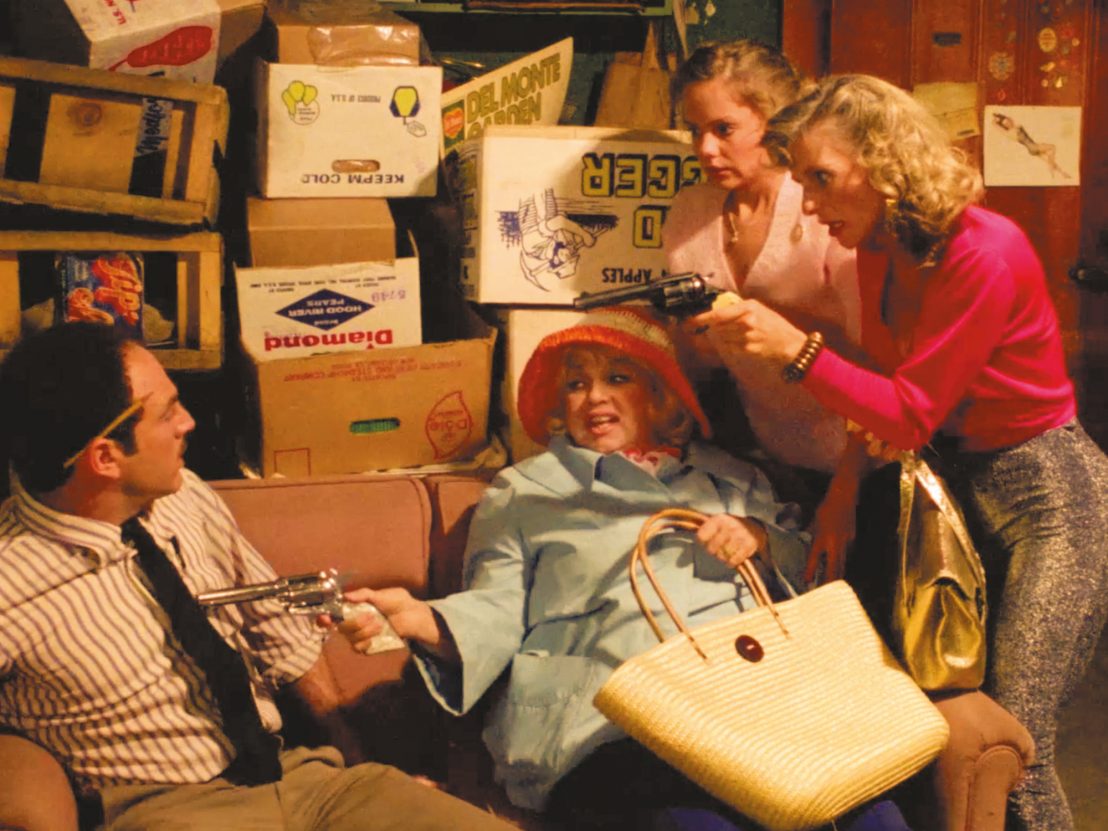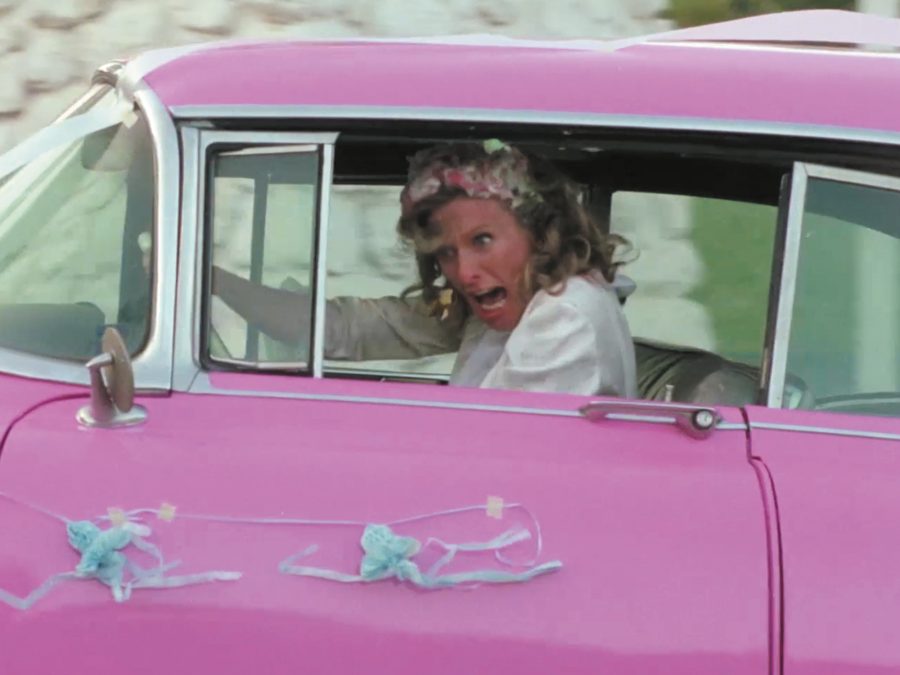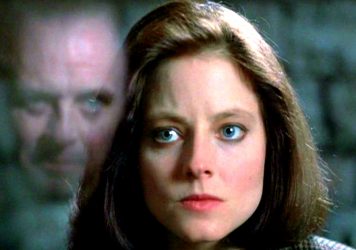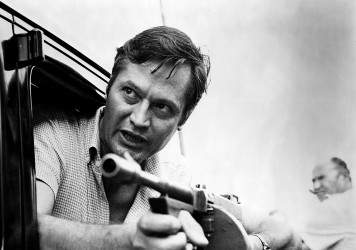
“You ladies are dangerous. This is America.” The speaker is landlord Mr Albertson (Jim Backus), surprised, as he evicts Melba Stokes (Cloris Leachman) and her mother Sheba (Ann Sothern) for failing to meet rent on their hair salon, that they are resisting his demands. This is Long Beach, California, in 1958, and not the first time that the Stokes have had to face the Man.
Crazy Mama opens 26 years earlier in Jerusalem, Arkansas 1932, with little girl Melba (Dinah Englund) witnessing the local police confronting her father to seize his farm property, and shooting him dead when he stands up to them. Melba fled interstate with her mother then, and is doing the same once more, back to her childhood home along with both Sheba and her own teenaged daughter Cheryl (Linda Purl) who is also now pregnant with child.
In other words, the damage done to this family has repeated itself down the generations, and will no doubt continue to do so, in a patriarchal America where ladies are as much made dangerous as born that way. Much as the Stokes’ modest American dream – to own their own home, to run their own business – is thwarted every time they seem to be getting a foothold, so too in their struggles they continue to flout established convention and to operate by their own rules, as both a criminal gang and a matriarchal counterforce (passing their outlaw ethos, and their surname, down from mother to daughter). They not only snatch their seized goods back from Mr Albertson, but steal his car and hit the road.
Determined to raise enough money on the way to repurchase their farm, they attract other misfits to their increasingly illegal endeavours: Cheryl’s surfer boyfriend Shawn (Don Most) and his ‘greaser’ biker rival Snake (Bryan Englund), who are soon both in bed with the pregnant, polyamorous girl who like her mother thinks of her baby as having multiple fathers; octogenarian Bertha (Merie Earle) who, having escaped the old people’s home where she was dumped by her family, is now living her best life; and Jim Bob (Stuart Whitman), a Texan who has unhappily married rich but feels a deep affinity towards Melba.
“I can tell you right now, you’re not gonna beat the system,” Jim Bob tells Melba at the Las Vegas casino where they first meet at a gambling table. “You can,” insists Melba, “if you take ’em by surprise. Hit where they don’t expect it.” Sheba agrees: “That’s how they keep getting us.” Yet in a nation of inequality where women, the poor and the marginalised never receive fair treatment, Jim Bob’s words will reecho, as Crazy Mama shows this extended family of misfits travelling a doomed road, even as it lionises their efforts to go against the odds.

The Stokes are all at once society’s downtrodden losers, and countercultural heroes, revealing – and reviling – an American dream slanted in favour of wealthy white men and turned sour for everyone else. At one point, when the family is in the process of being arrested by a policeman, it is a Native-American stranger (an uncredited Will Sampson) who intervenes violently to help them out, in tacit recognition that there is an intersection between the kinds of systemic oppression that he and they suffer.
With its freewheeling sex and vehicular chases, its robberies and shootouts, Crazy Mama is unquestionably a Roger Corman production, barely concealing its hicksploitation and hagsploitation beneath the bonnet of a rambunctious road movie. Yet it is also very much a women’s picture, bringing into focus the unequal opportunities available to its female characters. It would have been helmed by a woman too, but – in an ironic reflection of the film’s themes – underground director Shirley Jackson found herself being fired by Corman over creative differences ten days before shooting was due to commence.
Clarke was replaced by Jonathan Demme, whose career began helming exploitation pics for Corman like the women-in-prison film Caged Heat and Crazy Mama itself, before he went on to make his name with Something Wild, The Silence of the Lambs and Rachel Getting Married.
In keeping with its title, Crazy Mama plays as an unhinged comedy, but there is a rich seam of melancholy offsetting the humour, as the film simultaneously casts a nostalgic eye back to the late Sixties and the early Thirties, while bitterly observing how history either repeats or degrades. Finally back in her hallowed Jerusalem, the hometown that she has longed to revisit for decades, Sheba discovers a community full of closing-down sales and going-out-of-business signs, and remarks how it now looks no different from the place that she has just fled. “Why the hell would anyone want to do a thing like that, change Jerusalem?” she asks. “It was a nice town.”
Meanwhile, her beloved farm, long since annexed, appropriated and expanded, is now a luxury mansion for the affluent family that murdered her husband and kicked her out. This is a bleak vision of America as a landscape of endless rapine and élite profit, with everyone else forced to eke out an infernal existence amid ever-diminishing returns and the constant threat of being downsized again and moved on.
The Stokes may be thieves and delinquents ever striving – and failing – to settle into more legitimate business, but their criminality only mirrors the larcenous society around them, while their refusal, in all their powerlessness, to give in to the Man, to the system and to patriarchy itself makes them underground feminist icons. Although the screenplay was written by Robert Thom, the story came from Frances Doel, a Corman regular who had previously co-written Steve Carver’s similarly themed and titled Big Bad Mama, and her sensitivity towards the film’s female characters survives the many exploitation elements imposed upon them.
Crazy Mama also boasts the first, blink-or-you’ll-miss-them on-screen appearances of future film stars Dennis Quaid and Bill Paxton (both uncredited), and a cameo (also uncredited) from writer/director John Milius.
Crazy Mama is released on Blu-ray, 13 June, 2022, by 101 Films
Little White Lies is committed to championing great movies and the talented people who make them.
Published 13 Jun 2022

By Anton Bitel
The director’s short experimental feature, Lux Æterna, plays like a panic attack before reaching a rapturous crescendo.

Jonathan Demme’s 1991 masterpiece evokes fear by putting us in the protagonist’s shoes.

The self-styled ‘Pope of Pop Cinema’ talks about his amazing life as an on-the-lam moviemaker.